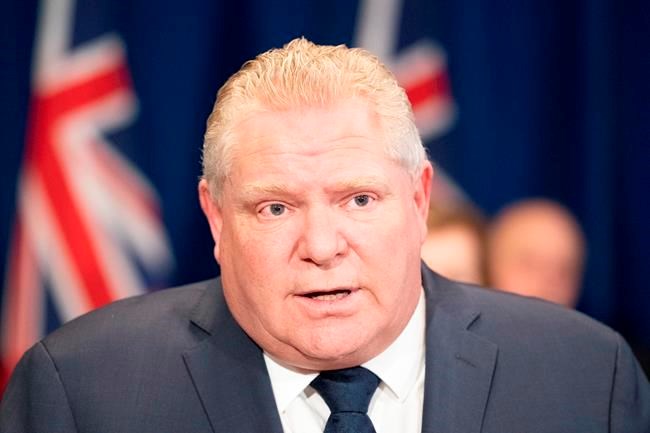By Colin Perkel
TORONTO — As known COVID-19 cases rose nationally and almost all construction in the country's economic heartland was idled on Friday, health authorities in Ontario said the death toll in that province alone could be kept below a still-staggering 15,000 — if stringent isolation measures prove effective in curbing the pandemic.
In a sobering presentation, a top health official said the coronavirus might have killed as many as 100,000 people in Ontario had economy-crushing restrictions not been imposed.
"If we do everything that we can think of — everything that already has been done stays in place (and) all of the other measures which are being considered (are) put in place — I think we could reduce the death toll in Ontario to somewhere between 3,000 and 15,000," said Dr. Peter Donnelly, head of Public Health Ontario.
The latest data indicate more than 12,000 Canadians have contracted the virus. Of those, about 180 have died, but the numbers could be higher given gaps in reporting.
Ontario released its worst-case projections for the COVID-19 as its known caseload — and those of other provinces — climbed again. The province has now seen 3,255 cases and 67 deaths.
Given the "extremely serious" situation, Premier Doug Ford announced a halt to almost all industrial construction.
"We've told the vast majority of Ontario's work force to stay home," a grim Ford said. "Lives are on the line."
The pandemic and the unprecedented stay-at-home measures to fight it have taken a brutal toll on the economy and jobs, with no sign of near-term improvement.
Prime Minister Justin Trudeau announced the latest in a string of federal measures to cushion the blow: More aid to low-income people will flow through the GST credit this month, rather than in May. Qualifying adults will receive up to $300, plus $150 for each child.
Trudeau also said the military would move into northern Quebec, at the province's request, to help remote communities cope.
Canada's top public health official, Dr. Theresa Tam, noted a sharp increase in deaths but said the health-care system was coping. The national death rate stands at about one per cent of those testing positive.
British Columbia, with 31 deaths as of Thursday, had previously projected its worst case would see a shortage of about 182 intensive care beds and at least 38 ventilators. But it also said distancing measures appeared to have mitigated that threat. Donnelly said Ontario was more closely tracking the hard-hit United States than B.C.
Quebec, which reported 25 more deaths on Friday for a total of 61 and a caseload of more than 6,000, said medical authorities would present COVID projections on Tuesday. New Brunswick, Nova Scotia and Prince Edward Island said they would also do so next week.
Overall mortality among those 80 years and older in Ontario has reached 20 per cent in coronavirus cases. A hard-hit nursing home in Bobcaygeon, Ont., reported four more resident deaths on Friday, bringing the toll to 20 at the 65-bed facility.
Experts advise frequent hand-washing and staying at least two metres from others to save the health-care system from overload. Front-line doctors have expressed worry about having to choose who lives and who dies if crucial ventilators run short.
In a tribute to health-care personnel, all ships in B.C. waters planned to sound their horns at 7 p.m. local time. Toronto's CN Tower has been lighting up blue in a similar show of solidarity.
Health Minister Patty Hajdu late Thursday stood by her earlier estimate that between 30 per cent and 70 per cent of Canadians will likely become infected.
"Having 70 per cent of people get COVID is not the end of the world," Hajdu said. "It is, though, if it all happens at once. And that's what we're trying to prevent."
Globally, the pandemic has infected more than one million people and killed more than 58,000, according to the latest official figures. Italy, with almost 15,000 deaths and Spain with about 11,000, have been hit hardest. The United States, however, leads the world in cases — a quarter of a million to date — and has reported more than 6,000 deaths.
—with files from Canadian Press reporters across the country.
This report by The Canadian Press was first published April 3, 2020.



